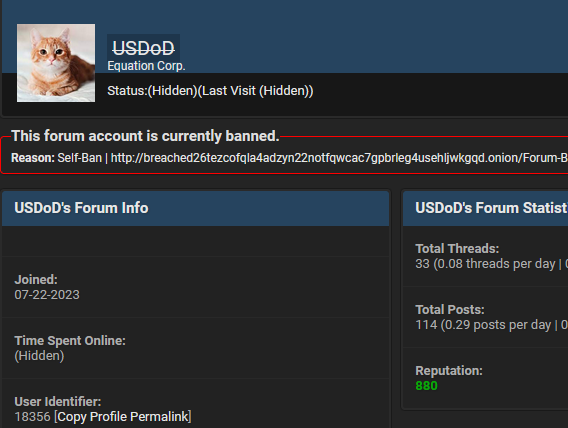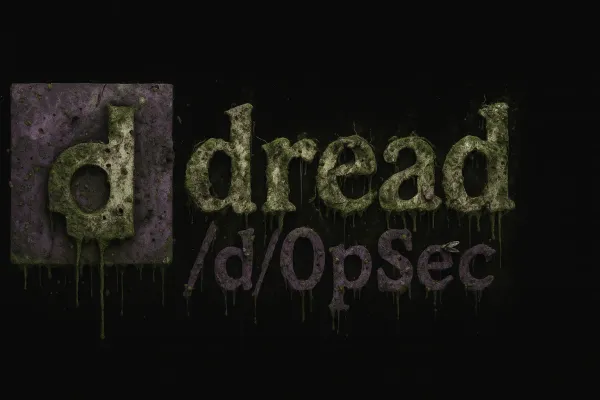Threat Actor USDoD doxed?
Initial reports of USDoD, the hacker behind the massive $3 billion SSN leak, has been identified as a Brazilian citizen. #HackerIdentity #CyberCrimeNews #DataSecurity

The threat actor known as USDoD aka EquationCorp., responsible for one of the largest data breaches in history, has revealed his identity as a Brazilian citizen. This disclosure adds a new layer of complexity to the ongoing investigation and raises questions about the international implications of such a significant breach. The breach, which compromised over $3 billion worth of Social Security Numbers (SSNs), has left an indelible mark on cybersecurity history.
A Massive Data Compromise
USDoD orchestrated a breach that resulted in the theft of over 120 million Social Security Numbers (SSNs), causing an estimated $3 billion in damages. This breach not only exposed sensitive information but also highlighted the vulnerabilities in the security systems of major institutions.
According to cybersecurity expert Brian Krebs, "This breach stands as a testament to the growing sophistication of cybercriminals who can inflict significant damage with relative impunity."
The scale of the breach and its financial impact demonstrate the increasing risks associated with inadequate cybersecurity measures. The compromised data included not just SSNs, but also other personal and financial details that have been used in various forms of identity theft and fraud.
Identity Revealed: The Brazilian Connection
USDoD recently revealed himself as a Brazilian citizen, complicating efforts to extradite him to the United States. Brazil's extradition laws are notoriously stringent, especially when it comes to their own citizens, making it unlikely that the hacker will face justice in the U.S.
In a recent interview, USDoD stated:
"So congrats to Crowdstrike for doxing me, they are late for the party, intel421 Plus and a few other companies already doxed me even before the Infragard hack. I want to say thank you, it is time to admit I got defeated and I will retire my Jersey. Yes, this is Luan speaking. I won’t run, I’m in Brazil, the same city where I was born. I am a huge valuable target and maybe I will talk soon to whoever is in charge but everyone will know that behind USDoD I’m a human like everyone else, to be honest, I wanted this to happen, I can’t live with multiple lives and it is time to take responsibility for every action of mine and pay the price doesn’t matter how much it may cost me. This is not my end. Thank you, see you around. Don’t worry Brazilian authorities, I’m coming to meet you, I’m not a threat, in fact, I can do much for my country."
This statement highlights the legal and diplomatic hurdles that U.S. authorities face in attempting to bring him to justice. However, given the U.S. government’s track record with international pursuits, it's uncertain whether Brazil’s legal protections will hold firm in this high-profile case.
USDoD's Other Notorious Hacks
USDoD is not new to the world of cybercrime. Below is a table detailing some of his other significant hacks. Further analysis and an in-depth threat actor profile will break down many more of his hacks with additional details:
| Year | Target | Details | Impact |
|---|---|---|---|
| 2016 | Equifax | Breach of Equifax, compromising the personal information of 147 million people. | Estimated damages of $4 billion, widespread identity theft, and the loss of consumer trust. |
| 2018 | Marriott International | Hacked Marriott’s guest database, exposing 500 million guest records, including passport numbers and credit card information. | Class-action lawsuits, significant financial losses, and a major overhaul of Marriott’s cybersecurity practices. |
| 2020 | FBI Database | Gained access to an FBI database containing sensitive law enforcement information, including details on ongoing investigations. | Potential compromise of national security, disruption of investigations, and increased pressure on the FBI to tighten security. |
| 2021 | Colonial Pipeline | Involved in the ransomware attack that disrupted fuel supply across the Eastern U.S., causing widespread panic and economic impact. | Fuel shortages, increased cybersecurity measures for critical infrastructure, and an estimated ransom payment of $4.4 million in Bitcoin. |
These incidents underscore the significant impact USDoD has had on both the public and private sectors, demonstrating the far-reaching consequences of cybercrime.
Legal Implications and International Response
The revelation of USDoD's nationality has sparked a debate on the effectiveness of international law in dealing with cybercriminals. The United States has long struggled with extradition requests being denied, and this case is no different. Experts suggest that this could lead to further diplomatic tensions between the two nations.
Brazil’s protectionist stance complicates the global effort to combat cybercrime, as cybercriminals may exploit these legal loopholes to evade capture and prosecution. As USDoD himself mentioned:
"As long as I am here, I am untouchable. The world may hate me, but Brazil’s laws keep me safe."
I would tend to agree with this. That said, if you're reading this article, USDoD, reach out to me; I’d love to have an interview like we planned before!
The Hacker’s Motive and the Impact on Victims
USDoD's motives appear to be financially driven, with the stolen data likely being sold on darknet marketplaces. The impact on the victims has been severe, with many facing long-term consequences such as identity theft, financial loss, and ongoing credit issues.
In the words of a victim who wished to remain anonymous:
"My life has been turned upside down. The financial strain and the constant fear of further attacks have made this experience a nightmare."
This breach serves as a chilling reminder of the potential fallout from cybercrime and the importance of stringent security measures. The far-reaching consequences of such breaches often leave victims struggling for years to recover their financial stability and sense of security.
Conclusion: A Case Study in Modern Cybercrime
The USDoD case is a prime example of the challenges faced in modern cybersecurity. As hackers continue to operate across borders, the need for international cooperation in law enforcement becomes more critical. This incident not only underscores the importance of data security but also the difficulties in ensuring that cybercriminals are brought to justice.
USDoD’s ability to evade capture, shielded by Brazil’s laws, reflects the complexities of prosecuting international cybercriminals in a world where jurisdictional boundaries often hinder justice. As the global community grapples with these challenges, the USDoD case will likely remain a pivotal reference in discussions about international cybercrime and the laws that govern it.




